unit4 导学案
人教版七年级英语上unit4-导学案(知识点解析)

Unit 4 Where’s my backpack?Where’s my backpack? 我的背包在哪里?Where 是疑问副词,意为“在哪里,在什么地方”,引导特殊疑问句。
句型:Where + is\are +主语(人或物)?答语:主语(人或物)+ is\are +方位介词。
如:-Where is Gina? -she’s in the classroom.注意:Where is 可以缩写成Where’s,Where are可以缩写成Where’re.翻译短语1.在沙发上_______2.在床下___ _____3.在我背包里__________4.在桌上________5.under the chair___________6.on the dresser________ _7.in the drawer__________一、选择填空。
( )1. ___________ is your new pencil case? It’s in the bag.A. WhatB. WhereC. HowD. Who( )2.Is he Jack Smith? _________________.A. Yes, he’sB. Yes, it isC. Yes, he isD. No, it isn’t( )3.The boys are ___ the tree.A. onB. inC. toD. for( )4.-Where are Lucy’s friend? -___ in the room.A. TheyB. They isC. ThemD. They are( )5.Are these Dave’s CDs?_________________________.A. Yes, these areB. No, they areC. Yes, they are二.句型转换。
1.My backpack is under the sofa.(对画线部分提问)_________________________ 2.His books are on the sofa.(改为一般疑问句)______________________________ 3.Are your books on the table?(作否定回答)________________________________ 4.Her brother is in the tree.(对画线部分提问)________________________________ 5.My pens are in the drawer.(改为否定句__________________________________6. Are those your books? (改为单数形式)____________________________________7. She is my sister.(改为复数形式)_______________________________________ ((Section A 2a-4))(2) 表示方位的介词或短语还有:In(在...里面), under(在…下面), behind(在…后面), in front of(在…前面),next to(在…隔壁), between…and…(在…和…之间)一.根据汉语意思,完成下列句子。
Unit4第5课时(SectionB2a-2f)(导学案)九年级英语全一册(人教版)

Unit4 Section B 2a2f导学案(2) Li Wen’s parents left him to work in the city a few years ago.(3) Nothing changed even after his parents moved to the city.(4) He never missed his parents and felt free and happy.4.Read Para.2 and answer the following questions.(1)How did his unhappiness influenced his schoolwork?______________________________________________ (2)Did Li Wen like the boarding school? How do you know?______________________________________________ (3)What did his teacher do when he wanted to leave?______________________________________________ (4)How did his parents get to his school?______________________________________________5.Read Para.3 and answer the following questions.(1)What does “it” refer to (指代)?______________________________________________ (2)What does Li Wen understand after the talk?______________________________________________6.Read Para.3&4 and fill in the blanks.Further thinking______________________________________________3.What can we learn from the story of Li Wen?______________________________________________4.2e plete the passage with the proper forms of the words and phrases in the box.be proud of / take pride in make a decision / decidemiss / be absent from change / influence look after / take care of 5.2f What do you think Li Wen and his parents talked about in their conversation.•Possible questions Li Wen might ask his parents•Questions his parents might ask Li Wen•Possible answers from Li Wen and his parents6.Retell Li Wen’s story according to the mind map1. 学业好; 学校表现好【参考答案】17.be there for their children1.They are leftbehind children.2.They leave the countryside to search for work in the cities.3.(3)What did his teacher do when he wanted to leave?She called his parents and advised them to talk with Li Wen in person.(4)How did his parents get to his school?They took a 24hour train and a 5hour bus ride.5.(1)What does “it” refer to (指代)?It refers to a long talk.(2)What does Li Wen understand after the talk?Even though his parents are busy,they are always thinking of him.They take pride in everything good that he does.6.1.What made Li Wen change so much ?2.What did Li Wen finally understand?It’s very important for parents to be there for their children.3.What can we learn from the story of Li Wen?more munication between parents and childrenmore understanding between parents and childrenparents’ love and careparents’ pany4.2e plete the passage with the proper forms of the words and phrases in the box. look after / take care ofmissed / was absent frommissed / was absent fromchanged / influencedchanged / influenced5.2f What do you think Li Wen and his parents talked about in their conversation.答案不唯一,合理即可6.Retell Li Wen’s story according to the mind map一、二、单项选择1—5 D C C C A。
部编RJ人教版PEP新目标 初三九年级英语 上册第一学期秋季(优质导学案)Unit 4 导学案
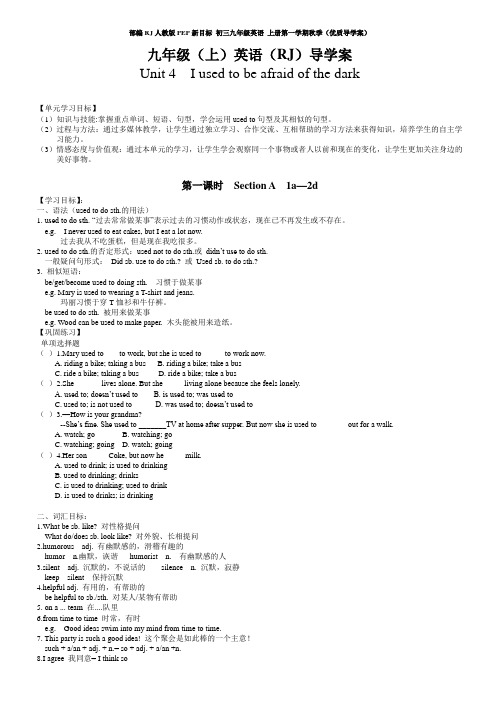
九年级(上)英语(RJ)导学案Unit 4 I used to be afraid of the dark【单元学习目标】(1)知识与技能:掌握重点单词、短语、句型,学会运用used to句型及其相似的句型。
(2)过程与方法:通过多媒体教学,让学生通过独立学习、合作交流、互相帮助的学习方法来获得知识,培养学生的自主学习能力。
(3)情感态度与价值观:通过本单元的学习,让学生学会观察同一个事物或者人以前和现在的变化,让学生更加关注身边的美好事物。
第一课时Section A 1a—2d【学习目标】:一、语法(used to do sth.的用法)1. used to do sth. “过去常常做某事”表示过去的习惯动作或状态,现在已不再发生或不存在。
e.g. I never used to eat cakes, but I eat a lot now.过去我从不吃蛋糕,但是现在我吃很多。
2. used to do sth.的否定形式:used not to do sth.或didn’t use to do sth.一般疑问句形式:Did sb. use to do sth.? 或Used sb. to do sth.?3. 相似短语:be/get/become used to doing sth. 习惯于做某事e.g. Mary is used to wearing a T-shirt and jeans.玛丽习惯于穿T恤衫和牛仔裤。
be used to do sth. 被用来做某事e.g. Wood can be used to make paper. 木头能被用来造纸。
【巩固练习】单项选择题()1.Mary used to ___ to work, but she is used to _____ to work now.A. riding a bike; taking a busB. riding a bike; take a busC. ride a bike; taking a busD. ride a bike; take a bus()2.She ______ lives alone. But she_____ living alone because she feels lonely.A. used to; doesn’t used toB. is used to; was used toC. used to; is not used toD. was used to; doesn’t used to()3.—How is your grandma?--She’s fine. She used to _______TV at home after supper. But now she is used to _______ out for a walk.A. watch; goB. watching; goC. watching; goingD. watch; going()4.Her son _____Coke, but now he _____milk.A. used to drink; is used to drinkingB. used to drinking; drinksC. is used to drinking; used to drinkD. is used to drinks; is drinking二、词汇目标:1.What be sb. like? 对性格提问What do/does sb. look like? 对外貌、长相提问2.humorous adj. 有幽默感的,滑稽有趣的humor n.幽默,诙谐humorist n. 有幽默感的人3.silent adj. 沉默的,不说话的silence n. 沉默,寂静keep silent 保持沉默4.helpful adj. 有用的,有帮助的be helpful to sb./sth. 对某人/某物有帮助5. on a ... team 在....队里6.from time to time 时常,有时e.g. Good ideas swim into my mind from time to time.7. This party is such a good idea! 这个聚会是如此棒的一个主意!such + a/an + adj. + n.= so + adj. + a/an +n.8.I agree 我同意= I think so表示不同意时用I don’t agree 或I disagree9.It’s been three years since we last saw our primary school classmates.自从我们上次小学同学见面以来已经有三年的时间了。
四年级英语第4单元自学导学案及答案

四年级英语第4单元⾃学导学案及答案四年级英语⾃学导学案⼀学习内容:Unit4 At the farm A Let’s talk学习⽬标:1、我能听、说、认读句型:Are these carrots? Yes, they are./ No,they aren’t. What are these? They ’re tomatoes.2、我能够在情境中恰当运⽤句型What are these? They’ re …询问并回答各种蔬菜或动物的名称。
3、我能够在情境中恰当运⽤句型They ’re so big/long/cute…描述物品特点。
学习步骤:⼀、新知预习1、请翻开课本P38,Let’s talk听录⾳3遍,请认真听并回答问题:What colour are these tomatoes?They are .2、跟读对话录⾳2遍。
写出下列单词的中⽂意思:these tomato carrot3、⼤声朗读课⽂两遍并回答问题:Are these carrots?What are these?4、Let’s play 跟读录⾳两遍,⼤声朗读两遍并试着理解对话的意思。
⼆、知识点⼩结:复数复数复数1. this →these carrot →carrots tomato→tomatoes2.询问近处的这些东西是什么时,⽤句型:What are these?答语:They are……Are these……? 肯定回答:Yes,they are. 否定回答:No, they aren’t.三、⾃我检测:(⼀)单项选择( )1. I like .A. carrots B . carrotes C. carrot( )2. --What are these? -- are carrots.A. These B .Those C. They( )3.The tomatoes yellow.A.is B .are C. am(⼆)连词成句(1) Are tomatoes these ?(2) are What these ?(3) big They’re so !(4)carrots are They .三、选择正确的翻译( )1.这些是什么?A. What are they?B. What are these?( )2.这些是西红柿吗?A. Are these tomatos?B. Are these tomatoes?( )3.不,它们不是。
人教版九年级全一册英语unit 4单元导学案unit 4 a

Ⅰ. 单词填写
1. humorous(adj. )
______________
2. score(n. &v. )
______________
3. silence(n. )
→__________ (adj. )沉默的
3. 他过去戴眼镜吗? __________ he__________ __________ wear glasses? 4. 比利的变化是如此的大! Billy has changed__________ __________ ! 答案: 3. Did; use to 4. so much
1. He used to be so shy and quiet. ____________________________ 2. It’s been three years since we last saw our primary school classmates. ____________________________ 答案: 1. used to意为“过去常常”, 后接动词原形, 表示过去的 动作和状态。 2. it’s是it has的缩写, 该句的前半句为现在完成时。
4. help(v. )
→__________ (adj. )有帮助的
答案: 1. 有幽默感的; 滑稽有趣的 2. 得分; 进球
3. silent 4. helpful
Ⅱ. 短语互译
1. 时常; 有时
______________
2. 戴眼镜
______________
3. 对……更感兴趣
______________
Unit4导学案人教版英语八年级上册

Unit4 What's the best movie theater? (一)7.19 背诵内容:一、单词 (课本P124) theater—fortably英汉互译默写后,红笔订正词形变换1. n./v. 安慰;舒适_________ adj.舒适的,使人舒服的___________ → adj.不舒适的__________→adv.舒服地,舒适地__________ → adv.不舒适地__________2.v.坐__________ →n.座位__________3.adj.差的,坏的_____ → adv.非常,很______比较级_______最高级__________4.adj.便宜的__________ → adv便宜地,低廉地__________5.v.选择,挑选__________→(过去式)__________→n.__________6.v.关心,关心_________ → adj.细心的,小心的,谨慎的_________→adv. 细心地,认真地,仔细地______→ adj.粗心的______→adv. 粗心地_________7.v.报道_________ →n.记者_________ →据报道_________8.adj.舒服的;舒适的____________→adv. 舒服地;舒适地________二、短语 背诵, 英汉互译默写后,红笔订正1.电影院movie theater2.最近的 the closest3.最短的 the shortest4.最好的音效 the best sound5.最无聊的the most boring6.最便宜地买到衣服buy clothes (the) most cheaply7. 在镇上 in town 8. so far 到目前为止默写短语 从课文中找出原句,或用短语造句(1a)1.______________ 电影院:______________________________(1b)2._______________最短的:_____________________________(1b)3.______________最好的音效:__________________________(2b)4._____________最便宜地买到衣服 :_____________________(2d)5.____________ 在镇上 :__________________________________6.____________到目前为止:____________________________自学 重点难点解析1.thanks for…谢谢……⑴“thanks for…”表示“因……而感谢”,介词for后可接____、代词或________形式。
unit4导学案-人教新目标英语八年级上册

学校生本课堂导学案课题Unit 4 What’s the best movie theater课型复习总课时学习目标1、能够熟记unit4单元的单词及短语。
2、通过复习,熟练掌握unit4单元中的语法知识:形容词最高级的用法。
3、学会谈论有关人的品质特征及对人的比较。
重点形容词最高级难点形容词最高级学法指导在形容词比较级的基础上,掌握形容词的最高级教学过程师生活动一、复习单词和短语1、so far 到目前为止,迄今为止2、no problem 没什么,别客气,3、have….in common有相同特征(想法、兴趣等方面)相同,4、be up to由…决定/是…的职责,5、all kinds of …各种各样的…… ,6、play a role 发挥作用,有影响7、make up 编造(故事、谎言等),8、for example=eg例如,9、take …..seriously 认真对待,10、not everybody并不是每个人,11、close to 离….近,12、more and more 越来越……二、重点句子1.The DJs choose songs the most carefully.2.How do you like it so far? 到目前为止,你认为它怎么样?3.Thanks for telling me.多谢你告诉我。
forget telling me忘记告诉我4.Can I ask you some questions?我能问你一些问题吗?5.(1)It has the most comfortable seats. 它有最舒服的座位。
(2)The DJs choose songs the most carefully.那些音乐节目主持人们选择歌曲最细致。
(1)How do you like it so far? 到目前为止你认为它怎么样?(2)Thanks for telling me. 谢谢告诉我。
鲁教版初一英语下册Unit 4导学案
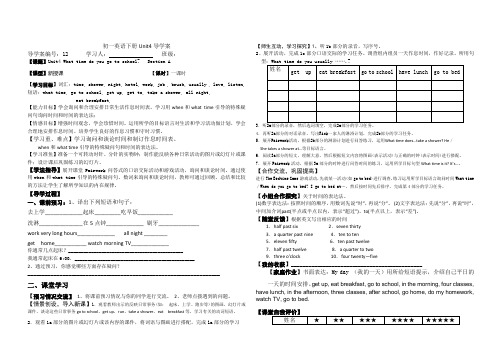
初一英语下册Unit4导学案导学案编号:12 学习人:班级:【课题】Unit4 What time do you go to school? Section A【课型】新授课【课时】一课时【学习目标】词汇:time, shower, night, hotel, work, job , brush, usually , love, listen, 短语:what time, go to school, get up, get to, take a shower, all night,eat breakfast,【能力目标】学会询问和合理安排日常生活作息时间表。
学习用when和what time引导的特殊疑问句询问时间和时间的表达法;【情感目标】增强时间观念,学会珍惜时间。
运用所学的目标语言对生活和学习活动做计划,学会合理地安排作息时间。
培养学生良好的作息习惯和守时习惯。
【学习重、难点】学习询问和谈论时间和制订作息时间表。
when和what time引导的特殊疑问句和时间的表达法。
【学习准鱼】准备一个可转动时针、分针的实物钟;制作能反映各种日常活动的图片或幻灯片或课件;设计课后巩固练习的幻灯片。
【学法指导】展开课堂Pairwork问答式的口语交际活动和游戏活动,询问和谈论时间。
通过使用when和what time引导的特殊疑问句、数词来询问和谈论时间,教师可通过回顾、总结和比较的方法让学生了解所学知识的内在规律。
【导学过程】一、课前预习:1、译出下列短语和句子:去上学_____________起床_________吃早饭____________洗淋_______________在5点钟_____________ 刷牙______________work very long hours_____________all night ________get home___________ watch morning TV_____________你通常几点起床?_____________________________________________我通常起床在6:00. _______________________________________________2、通过预习,你感觉哪些方面存在疑问?__________________________________________________________________二、课堂学习【预习情况交流】1、将课前预习情况与你的同学进行交流。
八年级英语Unit 4导学案已核(全)
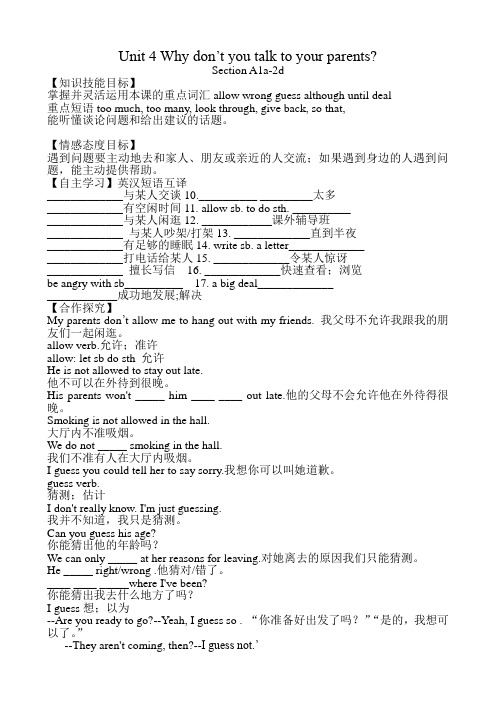
Unit 4 Why don‘t you talk to your parents?Section A1a-2d【知识技能目标】掌握并灵活运用本课的重点词汇allow wrong guess although until deal重点短语too much, too many, look through, give back, so that,能听懂谈论问题和给出建议的话题。
【情感态度目标】遇到问题要主动地去和家人、朋友或亲近的人交流;如果遇到身边的人遇到问题,能主动提供帮助。
【自主学习】英汉短语互译_____________与某人交谈10.__________ _________太多_____________有空闲时间11. allow sb. to do sth. _______________________与某人闲逛12. ____________课外辅导班_____________ 与某人吵架/打架13. _____________直到半夜_____________有足够的睡眠14. write sb. a letter__________________________打电话给某人15. _____________令某人惊讶_____________ 擅长写信16. _____________快速查看;浏览be angry with sb__________ 17. a big deal_________________________成功地发展;解决【合作探究】My parents don‘t allow me to hang out with my friends. 我父母不允许我跟我的朋友们一起闲逛。
allow verb.允许;准许allow: let sb do sth 允许He is not allowed to stay out late.他不可以在外待到很晚。
His parents won't _____ him ____ ____ out late.他的父母不会允许他在外待得很晚。
人教版七年级英语上册导学案Unit4整单元导学案
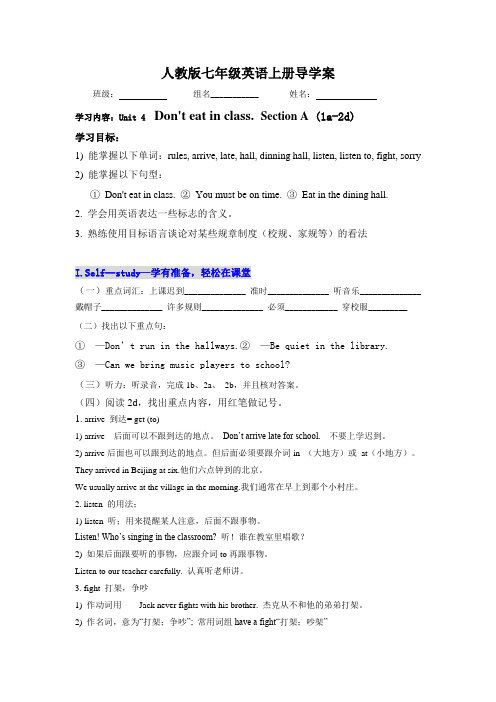
人教版七年级英语上册导学案班级:组名___________ 姓名:学习内容:Unit 4 Don't eat in class.Section A (1a-2d)学习目标:1) 能掌握以下单词:rules, arrive, late, hall, dinning hall, listen, listen to, fight, sorry2) 能掌握以下句型:①Don't eat in class. ②You must be on time. ③Eat in the dining hall.2. 学会用英语表达一些标志的含义。
3. 熟练使用目标语言谈论对某些规章制度(校规、家规等)的看法I.Self--study—学有准备,轻松在课堂(一)重点词汇:上课迟到______________ 准时______________ 听音乐______________ 戴帽子______________ 许多规则______________ 必须____________ 穿校服_________(二)找出以下重点句:①—Don’t run in the hallways.②—Be quiet in the library.③—Can we bring music players to school?(三)听力:听录音,完成1b、2a、2b,并且核对答案。
(四)阅读2d,找出重点内容,用红笔做记号。
1. arrive 到达= get (to)1) arrive 后面可以不跟到达的地点。
Don’t arrive late for school. 不要上学迟到。
2) arrive后面也可以跟到达的地点。
但后面必须要跟介词in (大地方)或at(小地方)。
They arrived in Beijing at six.他们六点钟到的北京。
We usually arrive at the village in the morning.我们通常在早上到那个小村庄。
Unit 4 When is the art show? Part C(导学案)-2022-2023

Unit 4 When is the art show? Part C(导学案)-2022-2023学年英语五年级下册知识目标•能够询问和回答关于活动时间的问题。
•能够掌握英语中的时间表达方式。
•能够运用所学知识进行日常交流。
能力目标•培养学生的英语口语表达能力。
•提高学生的英语听力和阅读理解能力。
•培养学生的团队合作能力。
重点难点•掌握时间表达方式。
•运用所学知识进行日常交流。
教学过程活动一:时间表达方式1.教师在黑板上画出钟表,向学生展示 12 个小时制和 24 小时制时间表达方式,让学生学习掌握两种方式的表达形式。
2.老师可以给出询问时间的问题,让学生运用所学知识进行回答。
–What time is it now?(现在是几点?)–What time is the art show?(艺术展览的时间是什么时候?)–When does the party start?(派对什么时候开始?)活动二:团队合作任务1.学生分为若干个小组,每个小组内部选举一个组长。
2.教师在课堂上告知学生一个挑战任务:要求学生在 1 分钟内用英语让另一个小组回答以下问题:–What time is it now?–What time is the art show?–When does the party start?学生需要合作高效完成任务,提高团队合作能力。
活动三:时间表达小游戏1.教师设计一个小游戏,让学生在游戏中进行时间表达的练习。
2.游戏规则:学生随机站在教室内任意的位置,老师问“what time is it?”学生需要迅速给出当前的时间表达表达,然后老师宣布“时间前进了几小时”,比如可以说“时间前进了三个小时”,学生需要根据老师的提示更新当前时间并表达出来。
游戏的目的是让学生掌握时间表达方式,并提高他们的英语口语表达能力。
课堂扩展学生可以回家练习口语,每个人都可以组织家人或朋友参与时间表达小游戏,提高实际生活中使用英语的意识,并巩固所学知识。
Unit4AGlimpseofthefuture单元导学案高中英语选择性
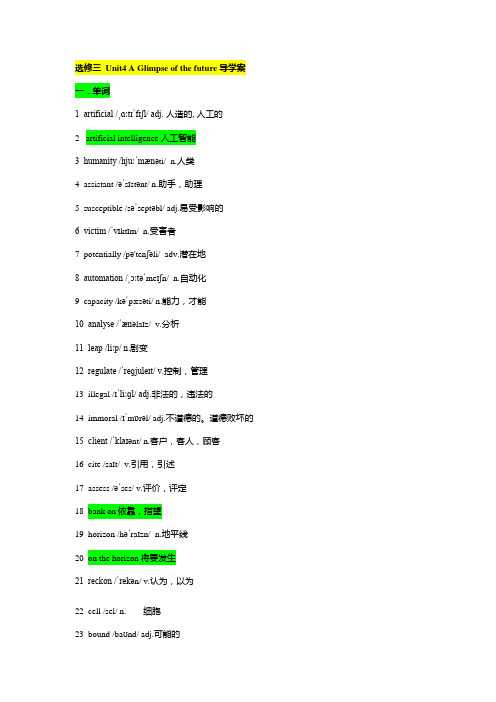
选修三 Unit4 A Glimpse of the future 导学案一.单词1 artificial /ˌɑːtɪˈfɪʃl/ adj. 人造的, 人工的2 artificial intelligence 人工智能3 humanity /hjuːˈmænəti/ n.人类4 assistant /əˈsɪstənt/ n.助手,助理5 susceptible /səˈseptəbl/ adj.易受影响的6 victim /ˈvɪktɪm/ n.受害者7 potentially /pə'tenʃəli/ adv.潜在地8 automation /ˌɔːtəˈmeɪʃn/ n.自动化9 capacity /kəˈpæsəti/ n.能力,才能10 analyse /ˈænəlaɪz/ v.分析11 leap /liːp/ n.剧变12 regulate /ˈreɡjuleɪt/ v.控制,管理13 illegal /ɪˈliːɡl/ adj.非法的,违法的14 immoral /ɪˈmɒrəl/ adj.不道德的。
道德败坏的15 client /ˈklaɪənt/ n.客户,客人,顾客16 cite /saɪt/ v.引用,引述17 assess /əˈses/ v.评价,评定18 bank on依靠,指望19 horizon /həˈraɪzn/ n.地平线20 on the horizon 将要发生21 reckon /ˈrekən/ v.认为,以为22 cell /sel/ n.细胞23 bound /baʊnd/ adj.可能的24 be bound to 很有可能,肯定会25 cycle /ˈsaɪkl/ n.自行车26 demand /dɪˈmɑːnd/ n.需要,需求27 crater /ˈkreɪtə(r)/ n.(物体坠落、炸弹爆炸等在地上造成的)坑28 agile /ˈædʒaɪl/ adj.敏捷的,灵活的29 slope /sləʊp/ n.倾斜,成斜坡30 hop /hɒp/ n.跳跃31 squeak /skwiːk/ v.发出吱吱声32 tendon /ˈtendən/ n.腱33 wavelength /ˈweɪvleŋθ/ n.波长34 mechanical /mɪˈkænɪkl/ adj.机械的35 imitation /ˌɪmɪˈteɪʃn/ n.仿制品36 mutt /mʌt/ n.杂种狗37 frown /fraʊn/ v.皱眉38 positronic /,pɔzi'trɔnik/ adj.正电子的39 tightly /ˈtaɪtli/ adv.紧紧地40 desperate /ˈdespərət/ adj.拼命的,绝望的41 clue /kluː/ n.线索,提示42 faulty /ˈfɔːlti/ adj.有故障的,有缺陷的43 consistent /kənˈsɪstənt/ adj.一贯的,一致的二.短语1.artificial intelligence 人工智能2.happen to...发生在……身上3.so far迄今为止4.in contrast相反5.hang out闲逛6.wipe out摧毁;毁灭7.lie in在于8.agree on就……达成一致9.go through经历(苦难等);完成;通过;检查;用完10.change one’s mind改变主意11.as though好像,似乎12.difference between...and...……和……之间的不同13.be bound to 很有可能,肯定会14.bank on 依靠,指望15.on the horizon 将要发生第一组(in短语)in detail 详细地;详尽地in public 公开地in charge 负责in case 以防;以防万一in general 总的来说第二组(hang 短语)hang around/about闲荡;等待hang on紧抓不放,坚持;别挂断hang up挂断;终止使用某物hang on to抓紧;保留;不放弃第三组(out短语)bring out使出现;出版;公布call out 出动;唤起;下令罢工e out 出版;出现;显露cut out 停止;剪裁;剪下;删除三.课文四.语法主谓一致(Ⅱ)一、数量概念作主语时的主谓一致[观察例句]1.Five minutes isn't enough to finish this work.2.Most of the workers are against the plan.3.A number of students have made up their minds to take part in after-school activities.4.The number of students who have made up their minds to take part in after-school activities is 120.[归纳用法]1.表示时间、距离、长度、重量等的复数名词短语作主语时,谓语动词用单数形式。
Unit 4 What can you do? Part B Let’s learn(导学案)人教P
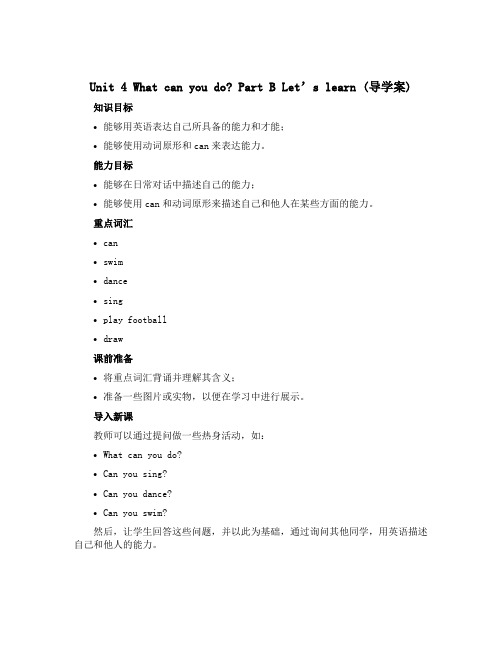
Unit 4 What can you do? Part B Let’s learn (导学案)知识目标•能够用英语表达自己所具备的能力和才能;•能够使用动词原形和can来表达能力。
能力目标•能够在日常对话中描述自己的能力;•能够使用can和动词原形来描述自己和他人在某些方面的能力。
重点词汇•can•swim•dance•sing•play football•draw课前准备•将重点词汇背诵并理解其含义;•准备一些图片或实物,以便在学习中进行展示。
导入新课教师可以通过提问做一些热身活动,如:•What can you do?•Can you sing?•Can you dance?•Can you swim?然后,让学生回答这些问题,并以此为基础,通过询问其他同学,用英语描述自己和他人的能力。
学习新知1.首先,教师可以通过展示图片或实物进行讲解,让学生了解每个动词的含义及其基本形式。
例如:•Swim: 游泳•Dance: 跳舞•Sing: 唱歌•Play football: 踢足球•Draw: 画画2.接下来,教师可以让学生掌握can这个助动词,并让他们知道它的用法和含义。
例如:•Can: 能够,会3.然后,教师可以让学生一起模仿以下句子并理解其中的用法:•I can swim. (我会游泳。
)•She can dance. (她会跳舞。
)•He can sing. (他会唱歌。
)•They can play football. (他们会踢足球。
)•We can draw. (我们会画画。
)4.让学生练习回答一些可能有用的问题,如:•Can you swim?•Can she dance?•Can he sing?•Can they play football?•Can we draw?学习拓展1.让学生练习用can和动词原形来描述自己和他人的能力,如:•I can run. (我会跑。
)•She can cook. (她会做饭。
Unit 4 Developing ideas 导学案-高中英语外研版(2019)必修第三册
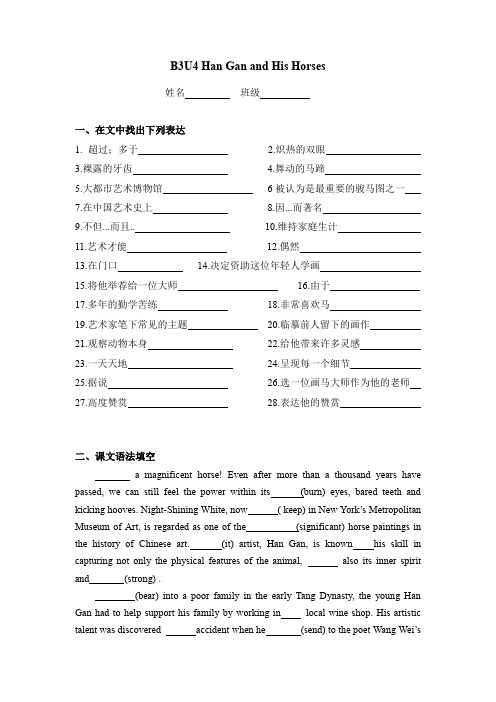
B3U4 Han Gan and His Horses姓名班级一、在文中找出下列表达1.超过;多于2.炽热的双眼3.裸露的牙齿4.舞动的马蹄5.大都市艺术博物馆6被认为是最重要的骏马图之一7.在中国艺术史上8.因...而著名9.不但...而且.. 10.维持家庭生计11.艺术才能12.偶然13.在门口14.决定资助这位年轻人学画15.将他举荐给一位大师16.由于17.多年的勤学苦练18.非常喜欢马19.艺术家笔下常见的主题20.临摹前人留下的画作21.观察动物本身22.给他带来许多灵感23.一天天地24.呈现每一个细节25.据说26.选一位画马大师作为他的老师27.高度赞赏28.表达他的赞赏二、课文语法填空a magnificent horse! Even after more than a thousand years have passed, we can still feel the power within its (burn) eyes, bared teeth and kicking hooves. Night-Shining White, now ( keep) in New York’s Metropolitan Museum of Art, is regarded as one of the (significant) horse paintings in the history of Chinese art. (it) artist, Han Gan, is known his skill in capturing not only the physical features of the animal, also its inner spirit and (strong) .(bear) into a poor family in the early Tang Dynasty, the young Han Gan had to help support his family by working in local wine shop. His artistic talent was discovered accident when he (send) to the poet Wang Wei’shouse to collect payment for some wine. While ( wait) at the gate, Han Gan used a stick to draw ( picture) in the dirt and was seen by the poet himself. Wang Wei decided ( sponsor) the young man to study painting and recommended him a master. Due Han Gan’s natural talent and years of hard work, he was ( eventual) chosen to serve Emperor Xuanzong in the royal palace.The Tang emperors were very fond horses. This (mean) that the animal was a frequent subject for artists. At that time, the most common way to study horse painting was by copying the works of previous painters. Han Gan’s method, however, was different—he observed the animal (it). He was a frequent visitor to the royal stables even moved in to live with the stable workers for quite some time. The horses, whether resting on the move, offered him plenty of (inspire). The more time he spent (observe) these animals, the more his understanding of them grew. Day after day, Han Gan painted the horses, his brush presenting every detail he saw with his own eyes.It is said when the Emperor asked Han Gan to take a master of horse painting his teacher, the artist (reply), “I have my own teachers, Your Majesty. All the horses in your stables (be) my very teachers.”Those saw Han Gan’s horse paintings all ( sing) high praises for his unique skill, (say) that his horses “could gallop off the paper”. Even Su Shi, the famous poet of the Song Dynasty, expressed his (admire) for Han Gan as a master of horse painting with the words, “The horses (paint) by Han Gan are real horses.”。
Unit 4(第4课时 Section B 1a-2b)(导学案)-七年级英语上册(人教版)
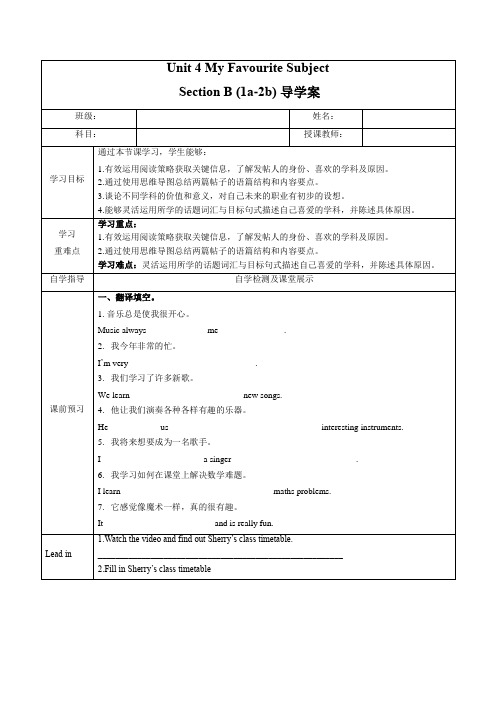
1.What’s your class timetable today? Write down the subjects.1.Let’s look at others’ information on the message board.①Where is the text from?____________________________________________________________②What’s the topic of the text?____________________________________________________________③What can you see on the message board?____________________________________________________________2.What can you predict from their usernames?____________________________________________________________3.1b Read the message board about the students’ favourite subjects. Underline all the school subjects each student has.____________________________________________________________________________________________________________________________________________________________________________________4.1c Read again and complete the table.5.Read again and answer the questions.① What subjects do Mike and Binbin both have?____________________________________________________________② How does Mike feel about music?____________________________________________________________③ What does Wu Binbin learn in his maths class?____________________________________________________________④Do you like music or maths? Why?____________________________________________________________6.Read again and complete the mind map.1.2a Discuss the following questions in groups and complete the mind map with your own2.2b Write a message using your information and post it on the board.3.Let’s thinkWhy do we have to learn so many subjects?What can you learn from different subjects ?____________________________________________________________一、用所给词的适当形式填空【参考答案】1.Watch the video and find out Sherry’s class timetable.2.Fill in Sherry’s class timetable1.What’s your class timetable today? Write down the subjects.1.Let’s look at others’ information on the message board.①Where is the text from?They are two posts(帖子)from the Internet.②What’s the topic of the text?Maybe they are about different subjects.③What can you see on the message board?There are two users.Mike Davis and Wu Binbin.2.What can you predict from their usernames?Maybe Mike’s favourite subject is music.Maybe Wu Binbin’s favourite subject is math.3.1b Read the message board about the students’ favourite subjects. Underline all the school subjects each student has.4.1c Read again and complete the table.5.Read again and answer the questions.① What subjects do Mike and Binbin both have?Maths,history,English,and IT.② How does Mike feel about music?Music always makes him happy.③ What does Wu Binbin learn in his maths class?He learns how to work out maths problems in class.④Do you like music or maths? Why?I (don’t) like music/maths because...6.Read again and complete the mind map.1.2a Discuss the following questions in groups and complete the mind map with your own。
人教新课标高中英语必修四Unit 4 Body language导学案(2)
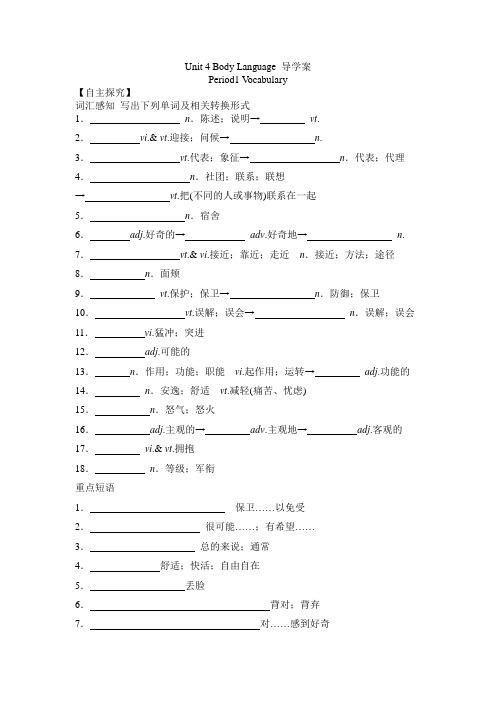
Unit 4 Body Language 导学案Period1 V ocabulary【自主探究】词汇感知写出下列单词及相关转换形式1.n.陈述;说明→vt.2.vi.& vt.迎接;问候→n.3.vt.代表;象征→n.代表;代理4.n.社团;联系;联想→vt.把(不同的人或事物)联系在一起5.n.宿舍6.adj.好奇的→adv.好奇地→n. 7.vt.& vi.接近;靠近;走近n.接近;方法;途径8.n.面颊9.vt.保护;保卫→n.防御;保卫10.vt.误解;误会→n.误解;误会11.vi.猛冲;突进12.adj.可能的13.n.作用;功能;职能vi.起作用;运转→adj.功能的14.n.安逸;舒适vt.减轻(痛苦、忧虑)15.n.怒气;怒火16.adj.主观的→adv.主观地→adj.客观的17.vi.& vt.拥抱18.n.等级;军衔重点短语1.保卫……以免受2.很可能……;有希望……3.总的来说;通常4.舒适;快活;自由自在5.丢脸6.背对;背弃7.对……感到好奇【课堂检测】语境活用(用单词的正确形式填空)1. The PRC ________(代表) the People’s Republic of China .2. They live in the same ________(宿舍).3. At noon ,students are in the _______(食堂) for lunch .4. Their _______(航班) number is 9573.5. Children are _______(好奇) about everything .6. A tourist _______(接近) us and asked us the way to Windsor Castle .7. Their ________(好奇) is good for their future development .8. Tears rolled down his ________(面颊).9. The surgeon is doing a ______(主要的) operation .10.There are different _______(方法) to language learning .11.He _______(误解) his partner and glared at him.12.The film is intended for _______(成人) .13. The most universal _______(面部的)expression ,of course ,the smile .14. The machine ________(运转) well .15. There has been a close ______(联系) between these two companies .16. He________(迎接/问候)all the guests warmly as they arrived.17. She gave her son a________(拥抱)and let him go to bed.学案1课堂检测答案:1.represents/stands for 2.dormitory 3.canteen 4.flight 5.curious 6.approached 7.curiosity 8.cheeks 9.major 10.approaches 11.misunderstood 12.adults 13.facial 14.functions 15.association 16.greeted 17.hugPeriod2&3 Warming up &reading预习案:What is body language?Part 1 Body language is one form of nonverbal ______________(交流) without using words. Eye contact or gaze(注视), facial____________, gestures, and __________ (姿势), or the way you stand, are different kinds of body language.探究案:Reading Communication: No Problem?Part 1 Read this passage within two minutes and answer these two questions. (para2&3) 1.How many characters(人物)are mentioned in our passage. Who are they?2. Do all members of all cultures behave the same way?Part 2 Matching the people and their different ways of greeting (para2&5)Mr Garcia (Columbia) 1.shakes hands and kisses otherstwice on each cheekJulia Smith (Britain) 2.bowsVisitor (Japan) 3.shakes handsGeorge Cook (Canada) 4.approaches others closely andtouches their shoulder andkisses them on the cheekMadame Coulon (France) 5.does not stand very close to others ortouch strangersPart 3: Find out the two mistakes the writer found in the airport:Mr. GarciaHe approaches Ms Smith by _______from ______ ________ and _______ her onThe first the ________.Mistake Julia Smith She ______ ________ appearing _______ andfrom take a few steps _______ ______ Mr. Garcia.Akira Nagata He ________ to Mr. Cook and his nose _________from Mr. Cook’s _______ ________.The secondmistake George Cook He ________ ________ _______ ________ tofrom the Japanese.Conclusion:Different countries have ___________(不同)cultures, so when people greet each other, they will have different_______(方式). If people don’t know the cultural differences well, people may have difficulties in________________(交流)with others throughout the world.训练案:Summary in (金牌学案)Language points预习案:Task1. Translate the following phrases into English:1. 向某人伸手索要________________2. 和某人握手_____________3. 向四周看____________________4. 上下点头__________________5. 避免做某事___________________6. 依靠____________________7. 挠头______________ 8. 与..相似______________9. 对…好奇______________ 10. 舒适,自在______________11. 把某人介绍给某人______________ 12. 代表中国政府______________ 13. 大体上,一般来说______________Task2 金牌学案---导学互动探究案:考点1.curiously adv. 好奇地curious adj.好奇的,求知的,古怪的,爱挑剔的活学活用:1..对你周围的世界感到新奇是件好事。
Unit4Iusedtobeafraidofthedark.导学案人教版英语九年级全册

Unit 4 I used to be afraid of the dark.Section A【学习目标和重点、难点】1.熟练运用used to do sth.谈论自己、他人过去的习惯、爱好、形象及经常做的事情。
2.能够听懂有关学习方法的简短对话。
3.能运用used to来谈论过去。
【学习内容及学习过程】(一)要点导学导学①I used to be afraid of the dark .used to do sth.过去常常做某事。
用于过去式中, 表示现在已不存在的习惯或状态。
查阅资料,掌握used to的用法。
跟踪练习(1) He______ ______ ____________ after school. 放学后他过去常常踢足球。
(2) He ____ ______ _____ ___________________________. 他过去不吸烟。
(3)He used to play football. (改为一般疑问句,再回答)_____________________________________________________________________拓展:be/get used to doing sth 意思是“习惯做某事”;be used to do sth和be used for doing sth表示“被用来做什么”。
导学②You used to be short, didn’t you? 复习反意疑问句,完成练习:Lily will go to China, ______ _____?She doesn’t e from China, ________ ________?(3) You haven’t finished homework, _________ __ ?(4) He knows little English, _________ ______?导学③区别下面两句的意思:跟踪练习(1) 我记得给花浇过水了。
Unit4WildlifeProtectionReading导学案- 高中英语人教新课标必修二

Unit 4Wildlife Protection导学案Class________ Name____________________一、课文(P.26)阅读理解本文以“穿越”的手法, 描述了小女孩Daisy在梦中经历的一次奇妙的飞毯旅行。
她去到了不同的地方,了解到了各地动物的保护情况。
请同学们快速阅读课文(15分钟)并按照课文内容填出各项信息:.Fill in the blanks with the proper words according to the text.Ⅰ.The first stopPurpose(目的): to see some 1. ______________Place: 2. _____________Animal:Tibetan 3. ______________Situation(情况): being hunted for the wool beneath its stomach and numbers are 4. ______________ rapidly Ⅱ.The second stopPurpose: to go to a place with wildlife 5. ________________Place: ZimbabweAnimal: African 6. ______________Situation: used to be hunted while now being protected by farmers and the numbers are 7. _____________Ⅲ.The third stopPurpose: to go to a place where the WWF is involved (涉及的;参与的)Place: 8. __________________Animal: 9. _________________Situation: The monkey can use the millipede insect to protect itself from 10. ______________.二、基本词汇学习(一)单词(每空一词)1._______________(n.) 野生动植物2. (n.) 保护______________ (v.)3.______________ (adj.) 野生的;荒凉的4. __________(v.) 减少;(使)变小________(反义词)5. (v.) 危害;使受到危险__________________ (adj.) 濒临危险的6. __ (n.) 损失___________(v.)7. (n.) 保护区8. (v.)打猎;搜寻9. (n.) 地域;地带10. (n.) 地毯11 (v.) 回答;作出反应(n.) 12. ___(adj.) 远的(n.) 13. (n.) 毛皮14. __ (n.) 仁慈;怜悯___________(adj.) 15.______________ (adj.) 确定的; 某一16. __(n.) 重要性____________(adj.) 17. (v.) 擦;摩擦18. ______________(n.) 蚊子19. ___(n.) 昆虫20._____________ (v.) 影响(n.) 21._______________ (vt.) 赏鉴;感激22. _____________(v.) 成功_____________(adj.) _____________(n.)23. _____________(adj.) 安全的; 可靠的24. ________________(n.) 收入25. (n./v.) 损害;危害.__________(adj.) 26______ (_______ __ __ )(v.) 叮;咬27 (n.) 恐龙28.. (vt.) 检查;视察29. _______________(n.) 事件30.______________(n.) 灰尘;尘土31._____________(adj.) 凶猛的;猛烈的32. ______________(n.) 结尾;结局33._____________(v.) 包含;容纳___________(同义词)34_______________(v.) 雇用;利用(二)词组(每空不限词数)1.灭亡;逐渐消失2.和平地;安详地3.在危险中4.如释重负;松了口气5.突然笑起来6.保护……不受……(危害)7.注意8.形成;产生9.按照;根据…..所说10. 以至于;结果三、重点词语学习1. mercy ( n.) 仁慈,宽恕;怜悯____________(adj.)相关短语:毫不留情without ____________ ; 任由……摆布at the__________ of对某人起了怜悯之心show________ ________ ______ ; 对某人仁慈be ___________ to sb. 完成句子:他们对敌人很仁慈。
- 1、下载文档前请自行甄别文档内容的完整性,平台不提供额外的编辑、内容补充、找答案等附加服务。
- 2、"仅部分预览"的文档,不可在线预览部分如存在完整性等问题,可反馈申请退款(可完整预览的文档不适用该条件!)。
- 3、如文档侵犯您的权益,请联系客服反馈,我们会尽快为您处理(人工客服工作时间:9:00-18:30)。
Unit 4 How do you get to school?Section A一、Teachers’ words: A lazy youth, a louse age.(少壮不努力,老大徒伤悲。
)二、Teaching Aims: Talk about how to get to school.1. How do you get to school?2. —How far is it from your home to school?—It’s three miles.3. —How longdoes it take you to get from home to school?—It takes 25 minutes.三、教学重、难点Leave for,The bus ride usually takes about 25 minutes.四、学习过程预习导学或自测/情景导入1.翻译下列短语,并熟练掌握1)到达_____________________ 2)乘地铁________________________________3)乘火车_____________________ 4)乘小汽车_______________________________5)步行去------___________________6)骑自行车_______________________________7)多远 _________________ 8)多久_________________9)多久一次______________ 10)动身去------_________________ 11)车站________________________12)早班车________________________13)从------到____________________14)匆忙的早餐___________________________2.自主学习1)leave, “离开;出发”。
过去式是left.如:We left the party at 8 o’clock.2)动词,“听任;让---处于”。
如:Did you leave the window open?3)动词,“遗留;遗忘”。
注意不用forget.如:I’ve left my things at home.考题再现(2010河南)1.It seems that it is going to rain. You’d better_the windows open when you leave the house.A. not leaveB. leaveC. not to leaveD. to leave2. hundred数词,“一百”。
若hundred前有具体的数字,则直接用“基数词+hundred”. There are five hundred students.易错点提醒:若表示“数百的”的约数概念,则用hundreds of. Thousand, million 也有类似用法。
考题再现--what’s the matter, Kangkang?--oh, I feel sorry to hear more than _____people lost their lives in the earthquake in Sichuan.A. sixty thousands ofB. sixty thousandC. six thousand ofD. thousand of3.合作探究1c, 2d, 3b Pairwork.4.拓展创新5. 达标检测一、单项选择( ) 1. —_____ did you go there? —By boat.A. WhenB. WhereC. HowD. Who( ) 2. —_____ is it from your home to the school?—About twenty minutes walk.A. How farB. How longC.WhenD. Where( ) 3. It takes _____ time to the work.A. too manyB. too muchC. a fewD. quite little( ) 4. —How does he go to Hong Kong? —_____.A. Take trainB. By trainC. By the trainD. By trains( ) 5. Our holiday is coming. Two _____ students in our school will go hiking.A. hundredB. hundredsC. hundred ofD. hundreds of( ) 6. —_____ water do you want? —A little.A. How manyB. How bigC. How longD. How much( ) 7. My uncle usually _____ a bus to go to work.A. takeB. byC. onD. takes( ) 8. It takes me twenty minutes ______ my homeworkA. to doB. doC. doingD. in doing( ) 9. How about going there _____ our bikes?A. inB. onC. atD. by( ) 10. How does Ken’s mother _____ home?A. getB. get toC. gettingD. gets( ) 11. —_____ does it take you to go to the park by taxi? —About 30 minutes.A. HowB. How farC. How longD. How many( ) 12. I _____ half an hour doing my homework every day.A. takeB. spendC. useD. cost( ) 13. It _____ me almost a quarter to go to school on foot every day.A. paysB. spendsC. costsD. takes( ) 14. —How do you go to school every day? —I _____ on my bike.A. rideB. driveC. takeD. walk二、词汇(根据句意及首字母提示完成单词,或用所给单词的适当形式填空)1. Another word for “ bike ” is b__________.2. There are 60 m__________ in an hour.3. My home isn’t far from here, it’s about two k__________.4. A sheep has four ________ ( foot ).5. It took them ten minutes __________ ( walk ) to the hotel yesterday.6. Different __________ ( country ) has different weather.7. In our school, most __________ (学生) take cars to school.8. Lily usually gets up at six, exercises and __________ ( have ) breakfast in the morning.9. It’s ov er three __________ ( hour ) ride from Shijiazhuang to Beijing.10. When it __________ ( rain ), I take a taxi.三、补全对话(选择合适的选项补全对话)A:Wang Dong, may I ask you some questions?B:Sure.A:1______B:At about 6:00. Then I shower and have breakfast. 2______A:3_______B:I ride my bike. Sometimes I walk.A:4_______B:1.5 kilometers.A:How long does it take?B:5______A. How far do you live from school?B. I leave for school at about 6:30.C. How do you get to school?D.I ride to school at 6:30.E. What time do you get up in the morning?F. It takes 10 minutes bike and 15 minutes on foot.G. Where do you live? Unit 4 How do you get to school?Section BTeachers’ Words:To choose time is to save time. (合理安排时间就是节约时间)Teaching Aims:Talk about hoe to get to places1. be different from2. depend on3. must be4. a number of一、预习导学1.翻译下列短语,并会读会写1)北美洲_____________________2)视------而定,决定于_______________ 3)乘船____________________ 4)汽车站_____________ / _____________ 5)地铁站__________________ 6)全世界___________________________ 7)与------不同_________________ 8)更有趣_________________9)需要做------ __________________________二、自主学习1. means名词,方法;手段;工具。
